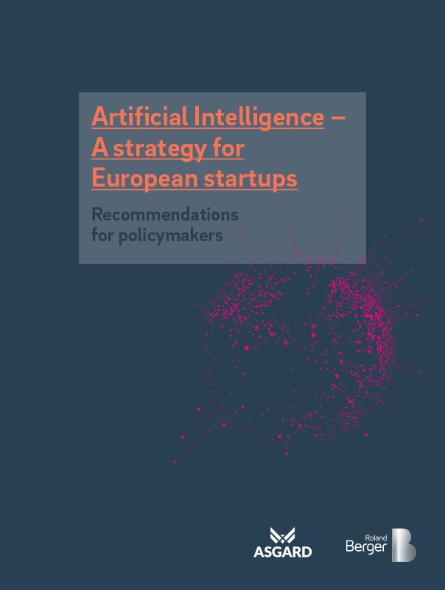AI startups as innovation drivers
![{[downloads[language].preview]}](https://www.rolandberger.com/publications/publication_image/roland_berger_ai_study_asgard_cover_download_preview.jpg)
European policymakers are recommended to set up the conditions for an artificial intelligence ecosystem.


Artificial intelligence (AI) is considered to become one of the main drivers of economic competitiveness in the upcoming decades. However, unlike in other cases, in AI it's not the big international companies that are pushing the development. Instead, AI innovation is a result from the work of research laboratories, digital platforms and – most importantly – startups: They are the breeding ground for new technologies such as image recognition, natural language processing or automated driving. Thus, establishing good conditions for these players is a prerequisite for a country's success in AI and subsequently its future economic competitiveness.

By analyzing about 3,500 firms worldwide we generated the first comprehensive dataset on AI startups and their global distribution. Not surprisingly, the USA is home to most of them: 1,393 startups or 40% of the global total number. Europe as a whole ranks second, with 769 or 22% of startups, followed by China (383/11%) and Israel (362/10%). However, no single European country achieves critical mass on its own: the UK is ranking 4th (245 startups), France 7th (109 startups) and Germany 8th (106 startups).
This is a clear sign that we need a European AI ecosystem rather than several ones at the level of individual countries. But so far, the continent is missing a clear strategy on how to achieve this. Even some of the most economically important sectors in Europe, like energy, automotive or agriculture, are currently underrepresented in the overall distribution of startups. European companies are top notch in technologies such as robotics, the Internet of Things (IoT) or self-driving cars, but, in comparison to other countries, the number of correspondent startups in Europe is low. This shows that mature European industries struggle to adapt to the next key technology trends – a must, if they want to maintain their leadership position.
In short, Europe has two tasks to work on: To foster own AI champions and, similarly important, to adopt AI technologies as soon as possible to benefit from competitive gains. If these tasks are not taken seriously, Europe's economy and its companies risk being left behind by early adopters in more mature American and Asian markets. To allow startups to drive the evolution of AI in Europe we recommend the following measures:
Only Europe as a whole can be a counterweight to US and Chinese competition in AI. To be successful the continent needs a plan to join all available resources and energies to maximize their impact.

![{[downloads[language].preview]}](https://www.rolandberger.com/publications/publication_image/roland_berger_ai_study_asgard_cover_download_preview.jpg)
European policymakers are recommended to set up the conditions for an artificial intelligence ecosystem.